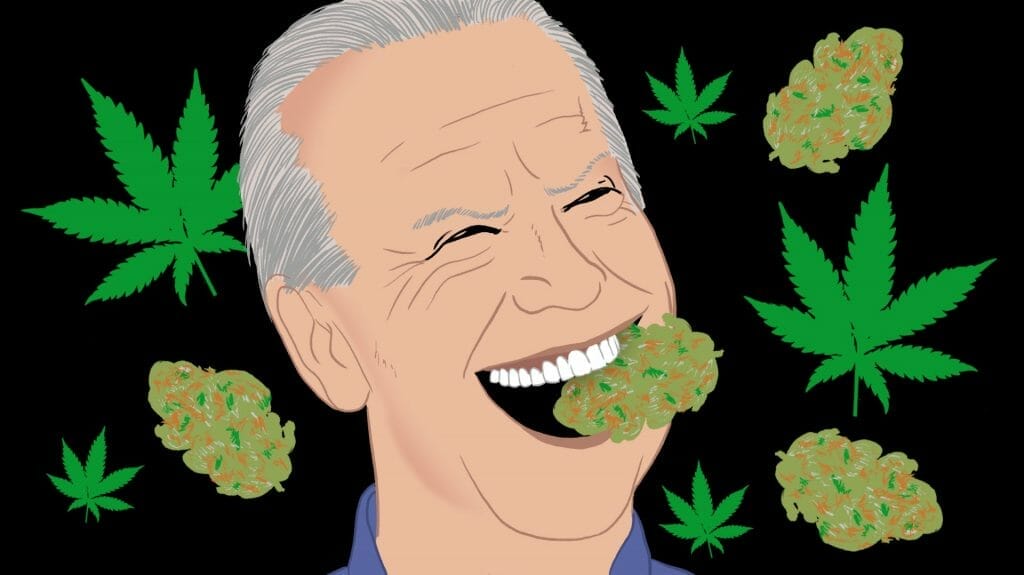Generic neoliberal bullshit
Look, I’m not a fan of Joe Biden, but I’m also not a ‘Joe Biden has soup for brains’ guy. I don’t think he’s stupid, although choosing to be being a sketchy politician in the state of Delaware isn’t as glorious as California, Texas, or New York. But Biden – the former Delaware senator did operate in a state where nearly every US business is located just to dodge taxes. When you see weed companies with properties in California, Oregon, and Florida, but they are registered in Delaware, that’s why – zero tax. So Biden is no stranger to the business world, he also has strong ties to Eastern European oil startups but that’s for another article. Hunter’s paintings actually do look really cool, he’s channeled his failson energy rather well, and he seems a lot more content with how fucked up he is compared to the Trump kids.
Anyways, instead of federally legalizing marijuana like most of America wants, Biden is proposing a half-measured approach. He wants to decriminalize cannabis and expunge the criminals he helped lock up with his 1994 Crime Bill. A little redemption for old Joe. He gets to make right with petty ‘criminals’ while also not rocking the boat. But it hasn’t been the most popular move across the aisle and even within his own party. Cory Booker joked that he thinks Joe is high for not moving to legalize cannabis.
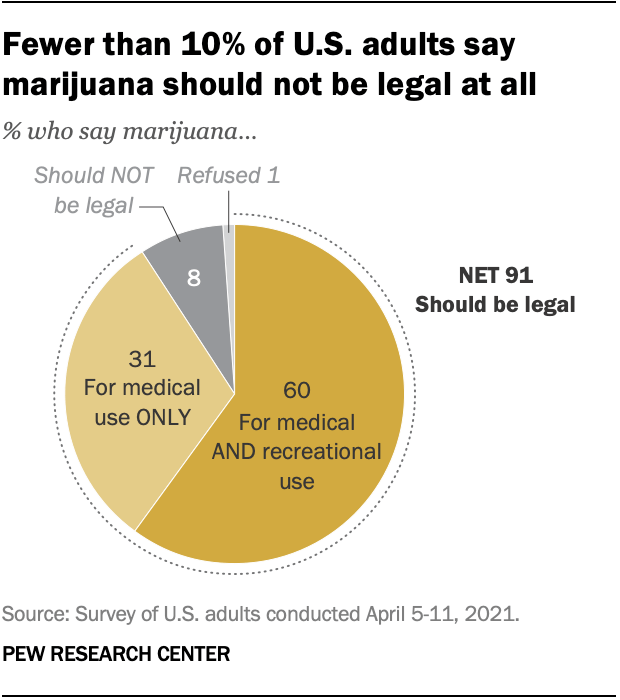
The Crime Bill was the result of years of work by Biden, who oversaw the Senate Judiciary Committee. It was an attempt to fix a big issue in America at the time: violent crime. Biden was amped about the bill, bragging after it passed that “the liberal wing of the Democratic Party” was now for “60 new death penalties,” “70 enhanced penalties,” “100,000 cops,” and “125,000 new state prison cells.”
The law also introduced harsher prison sentences.
It gave money for states to build more prisons, and aimed to fund 100,000 more cops, and backed grant programs that encouraged police officers to carry out more drug-related arrests — escalating the war on drugs. It also ballooned the country’s incarceration rate, look at that J curve in 1994, looks like Amazon’s (AMZN.Q) stock chart.
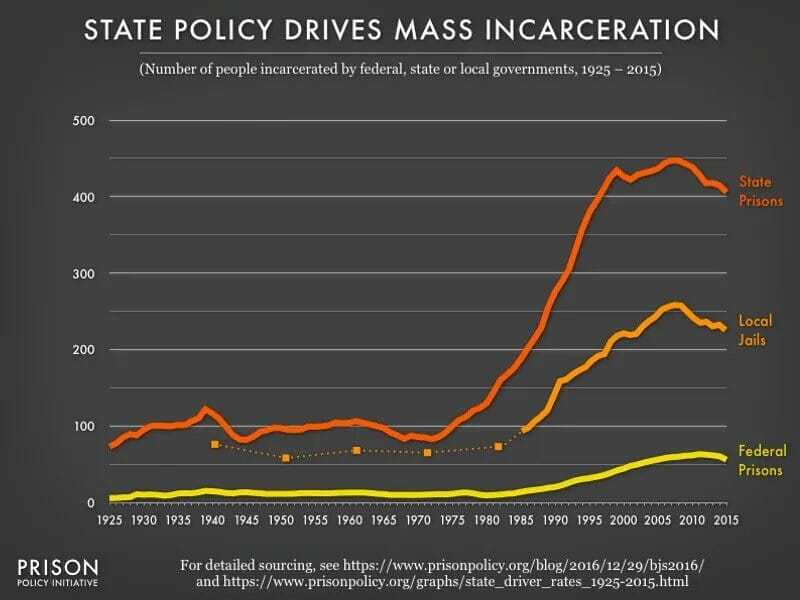
Koched up white paper
There was a growing sense among voters and Democrats that cannabis could be legalized in a Biden term that saw Democratic control of the House and Senate. It’s the perfect storm for passing a monumental bill that could change the US economy and open the door for investors and weed companies to generate even more revenue, and likely be a rare step in the right direction on the war drugs. Immediately after Biden beat Trump US weed stocks shot up, and they shot up even higher after the surprising Georgia senate race that fell to the Democrats, giving them a majority. And speaking of majorities, cannabis legalization is one of the most popular issues in the country today.
Some hopefuls thought Biden could use marijuana legalization as a hot topic issue in the 2022 midterms because doing anything after 2022 wouldn’t really make sense politically. Trying to market a new bill for the 2024 election from the guy who just had 4 years and the perfect logistical window to get shit done is a clear L. So that idea looks unlikely as of today.
Based on Biden’s track record he would be a Conservative in most countries, he even tried to make raves illegal back in the 90’s. But funny enough, in the most beautiful of ironic scenarios – it’s the conservatives who are helping push for marijuana legalization. The Koch brothers, along with a hodgepodge of other powerful US groups like: Global Alliance for Cannabis Commerce, The Koch-backed Americans for Prosperity, Libertarian think-tank Reason Foundation, Law Enforcement Action Partnership, A criminal justice-reform initiative called Mission Green. The coalition recommends removing marijuana from the federal Controlled Substances Act to resolve the current conflict between federal and state laws.
In the white paper, the coalition laid out several goals:
- Establish a regulatory framework that spurs innovation and research as well as ensure public safety.
- Ensure that individuals previously involved in the illicit market have opportunities in the legal market.
- Create low barriers to entry so that large companies and new entrepreneurs can compete on a level playing field.
- Ensure that the total tax burden doesn’t encourage a continuing gray or illicit market and instead contributes to a vibrant and competitive global industry.
The white paper states:
For the first time since Congress agreed with the Nixon Administration in 1970 to outlaw the possession, sale and manufacture of marijuana and marijuana-related products, congressional leadership has recently signaled a willingness to relent on those policies. In December 2020, the House of Representatives took a historic step by passing the Marijuana Opportunity Reinvestment and Expungement (MORE) Act to remove marijuana from the limitations of the Controlled Substances Act and expunge the records of those with previous federal convictions for marijuana.1 Although it was clear at the time of passage that the Senate would not concur before the conclusion of the session, the move signaled a changing attitude toward marijuana on Capitol Hill, securing a 228-164 bipartisan majority.
and
Congress should elect to regulate unfinished marijuana produce as an agricultural crop and commodity and delegate regulatory authority to the U.S. Department of Agriculture (USDA) to regulate that production. The USDA is the institutional regulator of agricultural crops and commodities in the US at the stage of farm production. As to dealing with the cannabis plant directly, USDA already regulates industrial hemp following passage of the 2018 Agricultural Improvement Act and hemp is a different strain of the same plant species as that from which marijuana is derived.
Weed stocks
Some US weed stocks have actually faired quite well this year, by taking a look at the bigger MSO’s like Trulieve (TRUL.C) and Curaleaf (CURA.C) investors still seem to be bullish despite the government’s lack of enthusiasm around legalization. These companies have scaled their operations so well operating with the weird legal framework that they have been able to keep steady revenues, and thus steady share prices. But other smaller-mid MSO’s like Charlotte’s Web (CWEB.T) and BaM (BAMM.C) haven’t been so fortunate. It’s the smaller-mid companies who would likely benefit most from federal legalization while the giants will keep on keeping on.
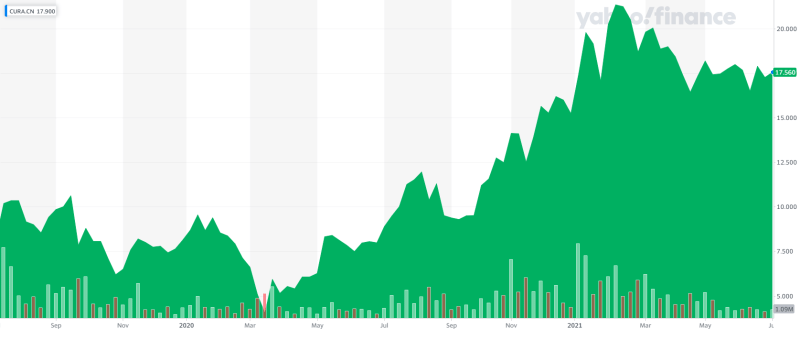
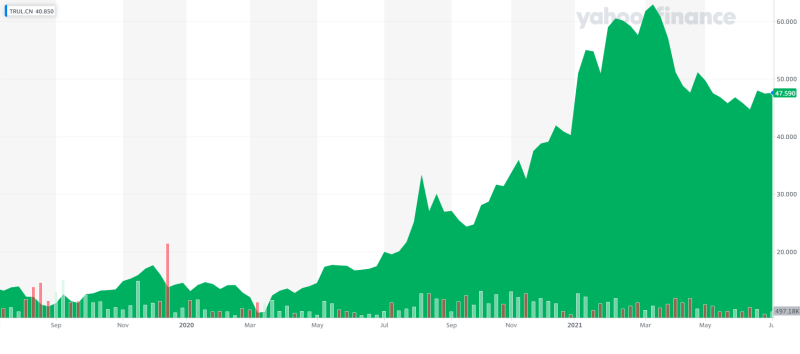
Sports!
The weird thing about how the US’s system is set up now is – although weed is legal in several states, it remains illegal federally. So hitting a bong in Oregon is both legal and illegal in a sense. Another example of this weird framework is seen in international competitions like the Olympics where just this month we saw some controversy over Sha’Carri Richardson being suspended by the Olympic team for using cannabis. She used in Oregon, a ‘legal’ state.
Sha’Carri Richardson was seen as a favorite in the 100-meter dash at the Tokyo Olympics before her suspension. Biden said ‘the rules are the rules’. Ironically, the record holder for Olympic Gold Medals coming in at 23 total is the American swimmer Michael Phelps – someone who has openly used cannabis in the past.
The NBA stopped testing for cannabis because too many of their top players would be playing for the Shanghai Sharks if they took cannabis use as a serious offense. A recent report on one of the league’s top players Kevin Durant said,
“He smokes even more weed than you would think. I was at his house at one o’clock in the morning. The entire place just reeks … He doesn’t have a girlfriend. He doesn’t go on crazy vacations … He doesn’t do anything other than hoop. Like nothing. He’s boring as hell. So going out to him is just blazing.”

